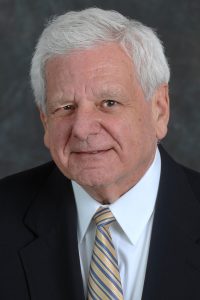By Minne Ho
The UCLA Luskin Center for Innovation and the Los Angeles Business Council has publicly released the report, “Designing an Effective Feed-in Tariff for Greater Los Angeles.” The report was unveiled yesterday at the Los Angeles Business Council’s Sustainability Summit, attended by hundreds of the city’s elected officials and business, nonprofit, and civic leaders.
J.R. DeShazo, the director UCLA’s Luskin Center for Innovation, has long studied how governments can promote and help implement environmentally friendly energy policies. His recent research on solar energy incentive programs, conducted with Luskin Center research project manager Ryan Matulka and other colleagues at UCLA, has already become the basis for a new energy policy introduced by the city of Los Angeles.
On Monday, March 15, Los Angeles Mayor Antonio Villaraigosa announced an ambitious program to move the city’s energy grid toward renewable energy sources over the next decade. Included in the plan is a provision — based in large part on the Luskin Center research — for a “feed-in tariff,” which would encourage residents to install solar energy systems that are connected to the city’s power grid.
The overall plan would require ratepayers to pay 2.7 cents more per kilowatt hour of electricity consumed, with 0.7 cents of that — a so-called carbon surcharge — going to the city’s Renewable Energy and Efficiency Trust, a lockbox that will specifically fund two types of programs: energy efficiency and the solar power feed-in tariff.
Under the feed-in tariff system, homeowners, farmers, cooperatives and businesses in Los Angeles that install solar panels on homes or other properties could sell solar energy to public utility suppliers. The price paid for this renewable energy would be set at an above-market level that covers the cost of the electricity produced, plus a reasonable profit. “A feed-in tariff initiated in this city has the potential to change the landscape of Los Angeles,” said DeShazo, who is also an associate professor of public policy at the UCLA School of Public Affairs. “If incentivized appropriately, the program could prompt individual property owners and businesses to install solar panels on unused spaces including commercial and industrial rooftops, parking lots, and residential buildings. Our projections show that the end result would be more jobs and a significant move to renewable energy with no net cost burden to the city.”
Feed-in tariffs for solar energy have been implemented in Germany and several other European countries, as well as domestically in cities in Florida and Vermont. The programs have moved these regions to the forefront of clean energy. And while these programs have necessitated slight increases in ratepayers’ monthly electricity bills, they have also generated thousands of new jobs. The mayor estimated that under the program announced Monday, 18,000 new jobs would be generated over the next 10 years. “For Los Angeles to be the cleanest, greenest city, we need participation from every Angeleno,” Villaraigosa said. “We know that dirty fossil fuels will only become more scarce and more expensive in the years to come. This helps move us toward renewable energy while at the same time creating new jobs.”
The new program had its genesis last year, when Villaraigosa announced a long-term, comprehensive solar plan intended to help meet the city’s future clean energy needs. The plan included a proposal for a solar feed-in tariff program administered by the Los Angeles Department of Water and Power. In September 2009, the Los Angeles Business Council created a Solar Working Group consisting of leaders in the private, environmental and educational sectors in Los Angeles County to investigate the promise of the feed-in tariff for Los Angeles and commissioned the UCLA Luskin Center for Innovation to lead the investigation. In addition to DeShazo and Matulka, the working group also included Sean Hecht and Cara Horowitz from the UCLA School of Law’s Emmett Center on Climate Change and the Environment. The first phase of their research examined current models operating in Germany, Spain, Canada, Vermont and Florida to propose guidelines for a feed-in tariff design. The second phase looks at the potential participation rates in a large-scale solar feed-in tariff program in Los Angeles and its impact on clean energy in the Los Angeles basin.
The Luskin Center for Innovation at the UCLA School of Public Affairs unites the intellectual capital of UCLA with forward-looking civic leaders in Los Angeles to address urgent public issues and actively work toward solutions. The center’s current focus in on issues of environmental sustainability.


